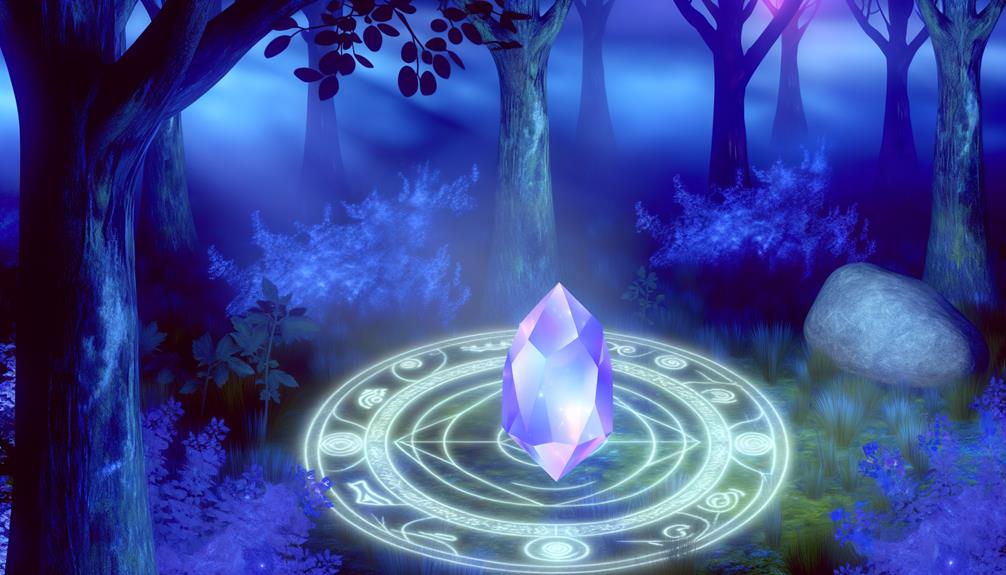Jasper Name Meaning and Origin
The name Jasper, rooted in the Persian word 'yashp', boasts a rich cultural heritage. It appears in classical antiquity and biblical texts, linked to the Magi and deeply ingrained in medieval European traditions.
Known as a 'nurturing stone,' jasper symbolizes protection, endurance, and tranquility. Revered in ancient Egypt for fertility, honored by Greeks and Romans, and esteemed in Native American cultures for its grounding energies, Jasper reflects diverse historical and cultural significance.
Its popularity has surged in modern times, influenced by media and notable namesakes like painter Jasper Johns. The name's profound resonance continues to captivate those interested in its layered history.

Key Takeaways
- Jasper originates from the Persian word 'yashp', reflecting its ancient roots.
- It is historically linked to various cultures, including ancient Egypt, Greece, and Rome.
- The name symbolizes protection, healing, and grounding energies.
- Jasper gained popularity through historical figures and modern media influences.
- The name is associated with the Three Magi in Christian tradition.
Historical Roots
The name Jasper has historical roots that trace back to ancient Persia, where it was derived from the Persian word 'yashp,' meaning 'treasurer' or 'keeper of treasure.' This etymological origin underscores the name's longstanding association with guardianship and value.
The appellation traversed various cultures and epochs, making notable appearances in classical antiquity and biblical texts. In the biblical context, Jasper is referenced as one of the twelve stones in the High Priest's breastplate, signifying its revered status.
Additionally, the name gained prominence in medieval Europe, often linked to the Magi, or the Three Wise Men, in Christian tradition. This rich historical tapestry emphasizes Jasper's enduring legacy across different civilizations and historical periods, reflecting its deep-seated cultural significance.
Meaning and Symbolism
The name Jasper is intrinsically linked to the gemstone of the same name, renowned for its multifaceted hues and protective qualities.
Historically, Jasper has been venerated across various cultures, symbolizing strength, stability, and grounding.
This section will examine the gemstone's significance and its cultural interpretations, shedding light on the profound layers of meaning embedded in the name Jasper.
Gemstone Significance
Renowned for its multifaceted symbolism, jasper has been revered throughout history for its purported protective and healing properties. Often described as the 'nurturing stone,' jasper is believed to provide stability and balance, fostering a sense of tranquility and grounding.
Its varied hues—from deep reds to earthy browns—are said to resonate with different energies, each offering unique benefits. Red jasper, for instance, is associated with energy and endurance, while green jasper is thought to alleviate stress and promote a sense of calm.
Additionally, jasper is frequently cited in metaphysical texts as a stone of endurance and courage, aiding in overcoming challenges and instilling a sense of determination. This gemstone's enduring allure lies in its profound, multifaceted significance.
Cultural Interpretations
Throughout diverse cultures and epochs, jasper has been imbued with a rich tapestry of meanings and symbolism, reflecting its esteemed status in both ancient and modern contexts.
In ancient Egypt, jasper was associated with the life-giving properties of the Nile, symbolizing fertility and protection. The Greeks and Romans revered jasper for its purported ability to attract rain and ward off evil spirits.
In Native American traditions, jasper was considered a sacred stone used for healing and connecting with spiritual domains. In the metaphysical domain, jasper is often linked to grounding energies, promoting stability and balance.
Collectively, these cultural interpretations underscore jasper's multifaceted significance, revealing its enduring appeal across varied historical and cultural landscapes.
Cultural Significance
In various cultures, the name Jasper has been imbued with rich symbolic meanings and historical significance, often linked to its gemstone namesake.
In ancient Persia, the jasper stone was believed to bring protection and courage, a sentiment that extended to those bearing the name.
In Christian tradition, Jasper is one of the Three Magi, also known as the Wise Men, who visited the infant Jesus, imbuing the name with a sense of wisdom and reverence.
Additionally, in Native American culture, Jasper is revered as a powerful amulet for grounding and spiritual healing.
This multifaceted cultural importance underscores the name's enduring appeal and deep-rooted resonance across diverse societies and epochs.
Popularity Over Time
Over the centuries, the name Jasper has experienced fluctuating levels of popularity, influenced by cultural shifts, historical events, and literary works.
In medieval times, Jasper was relatively common in Europe, attributed to its biblical connotations. The name saw a decline during the Renaissance but resurged in the 19th century, partly due to its use in literature and the arts.
In recent decades, Jasper has gained renewed interest, especially in English-speaking countries, as parents seek unique yet traditional names. This resurgence can also be linked to modern media and celebrity influence.
Statistical data from national registries indicate a steady rise in the name's usage, reflecting broader trends in naming conventions.
Famous Namesakes
The increasing popularity of the name Jasper can also be attributed to a number of noteworthy individuals who have borne this name across various fields and eras. These distinguished namesakes have significantly contributed to its enduring appeal:
- Jasper Johns: A prominent American painter and printmaker, Jasper Johns is celebrated for his work in abstract expressionism and pop art, notably his series featuring the American flag.
- Jasper Tudor: An influential figure in English history, Jasper Tudor was the uncle of King Henry VII and played a pivotal role in the Wars of the Roses.
- Jasper Fforde: A contemporary British novelist, Jasper Fforde is renowned for his inventive literary works, particularly the 'Thursday Next' series, which blends elements of science fiction and fantasy.
These individuals exemplify the name's rich cultural and historical resonance.
Modern Usage
In contemporary contexts, the name Jasper has gained significant traction, both in popular media and as a preferred choice among new parents.
This rise in popularity can be attributed to its frequent use in television series and films, which has heightened its visibility.
Consequently, Jasper has emerged as a fashionable and modern option for baby names, reflecting broader cultural trends.
Popularity in Media
Jasper has experienced a notable resurgence in media, particularly in film, television, and literature, where it is often employed to evoke a sense of timelessness and sophistication. This name's rich, historical connotations have made it a popular choice for character names, contributing to its renewed relevance.
Consider the following examples:
- Film: In 'Twilight,' Jasper Hale, a vampire with a Southern charm, adds depth to the narrative.
- Television: 'Steven Universe' features Jasper as a formidable gem, embodying strength and conflict.
- Literature: In 'The House of Night' series, Jasper serves as a moniker that enhances the mystical ambiance.
These instances illustrate how Jasper's usage in media underscores its enduring appeal and multifaceted character.
Contemporary Baby Names
Building on its illustrious presence in media, the name Jasper has also seen a significant rise in popularity as a contemporary choice for baby names. This resurgence can be attributed to its evocative blend of historical gravitas and modern appeal.
According to recent data from the Social Security Administration, Jasper has consistently climbed the ranks of favored names over the past decade. Its phonetic simplicity and multicultural resonance make it an attractive option for parents seeking a name that is both distinctive and timeless.
Additionally, Jasper's association with the precious gemstone enhances its perceived elegance and uniqueness. This combination of factors underscores its growing prominence in contemporary nomenclature, reflecting broader trends in naming practices.
Conclusion
The name Jasper, with its rich historical roots and profound meaning, carries significant cultural weight and symbolism. Its journey through time reflects fluctuating popularity and diverse cultural significance, while famous namesakes have cemented its place in history.
Modern usage continues to breathe new life into this storied name. Ultimately, Jasper's enduring appeal and multifaceted charm prove that it is a name that stands the test of time, seamlessly blending the old with the new.






